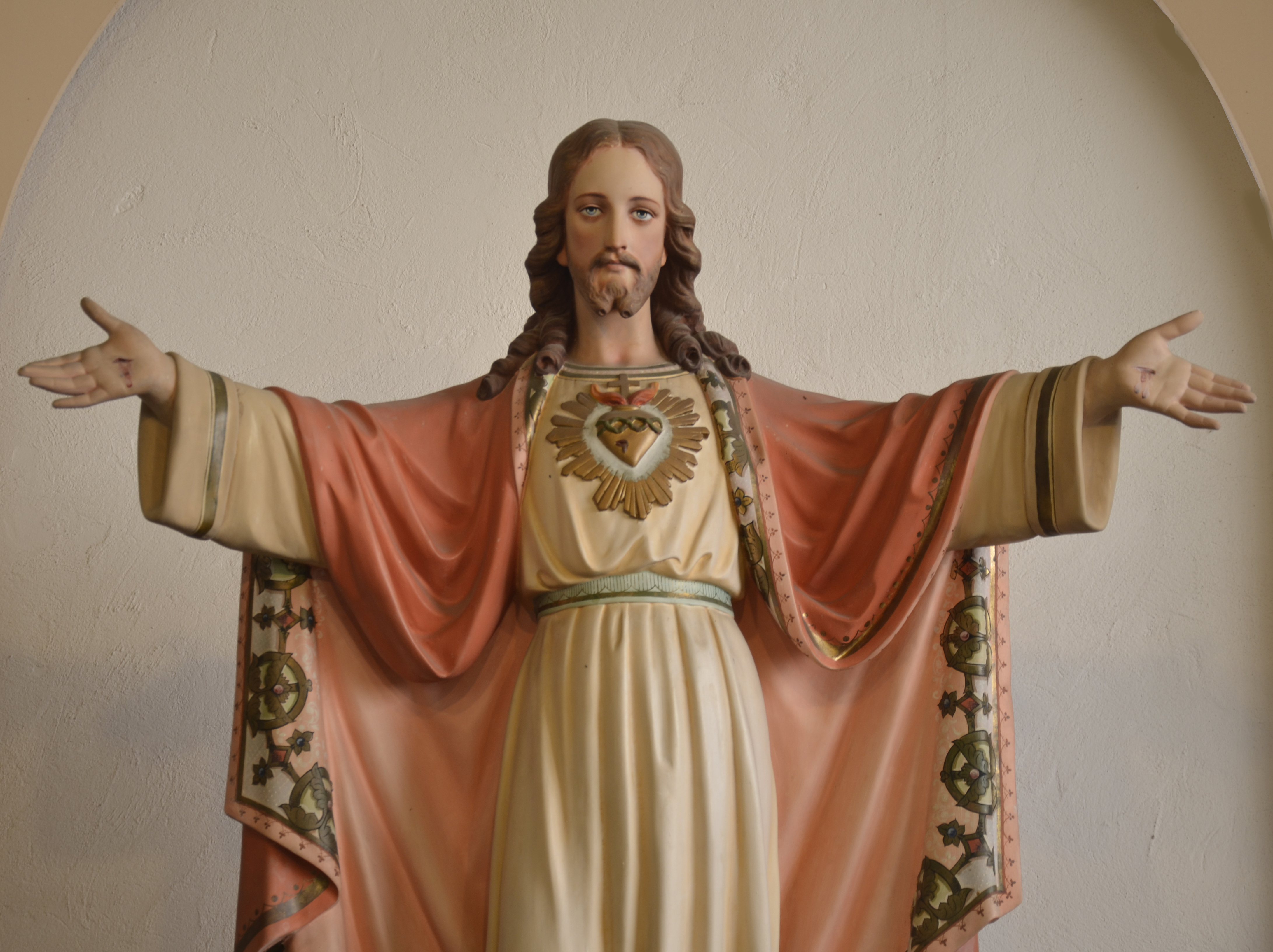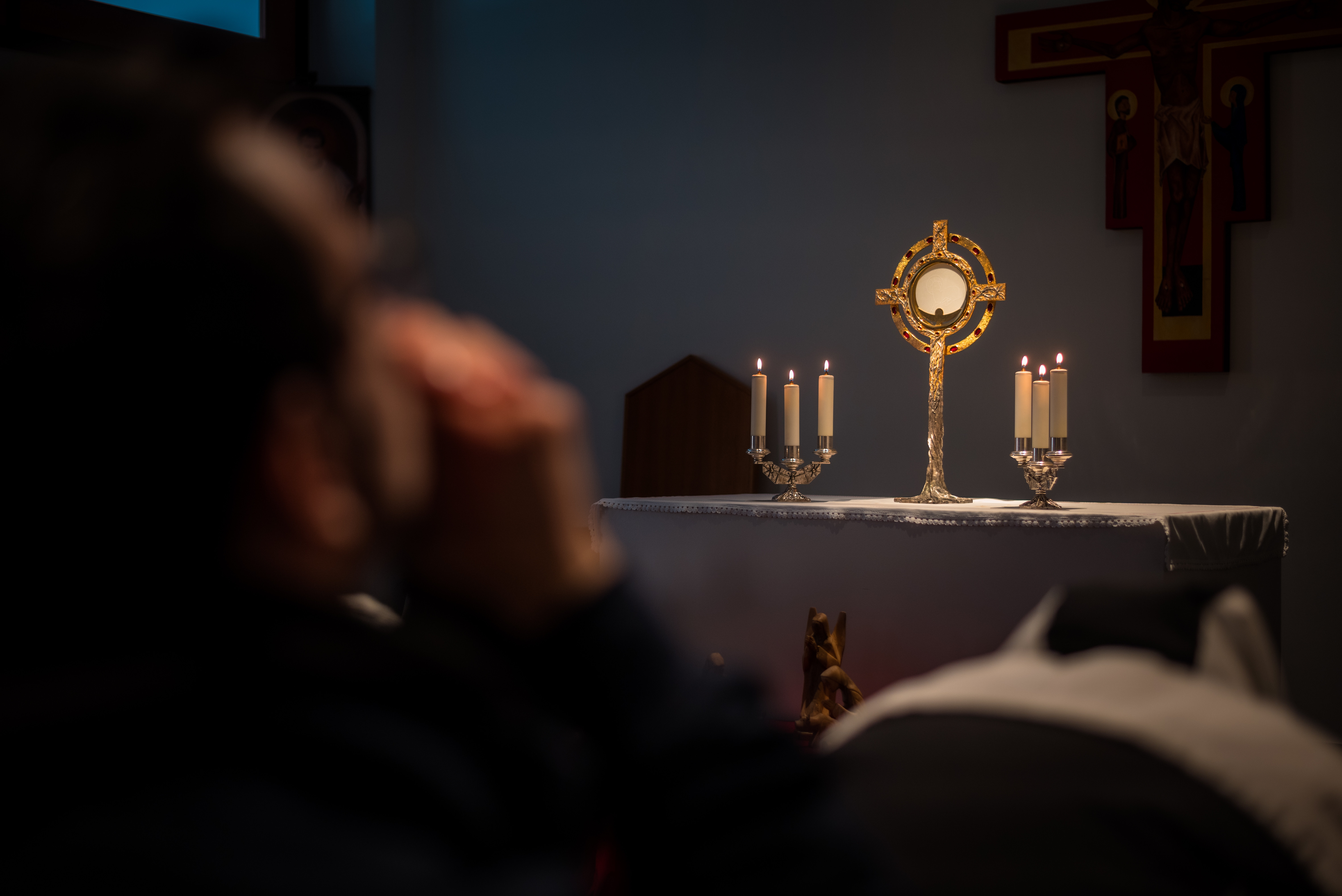In today’s First Reading, St. Paul is exhorting and encouraging the Corinthians in a way that makes me want to jump on a horse and ride into battle!
But the battle to which Christians are called has characteristics not often associated with warfare or victory. Just like the early Christians, we are called to endure hardships with “purity, knowledge, patience, kindness, in the Holy Spirit, in unfeigned love, in truthful speech, in the power of God.” So while we are often at odds with those who reject our world-view, the battle we fight is even more so a battle within ourselves. In other words, we risk making enemies when we live out the Gospel message, but if we want to represent Christ well, we must strive to be people of virtue even in the midst of conflict.
Years ago, I joined a group from my university who gathered to prayerfully protest the abortions that were taking place at an abortion mill in Pittsburg. We cared deeply about the vulnerable babies and their mothers. At one point, I knelt to pray with my eyes closed. Suddenly, a young man with a large camera started jeering at me as he snapped pictures close to my face. I continued to pray, feeling the peace that comes with knowing that you are right where you need to be. As my persecutor walked away, he allowed his camera to knock me on the side of the head. By God’s grace, I experience nothing but joy.
Fast forward 20 years. My husband and I, along with our 17-year-old son, objected to a book my son was required to read as part of his advanced literature course. The fact that the material was sexually explicit was only part of our concern. Unsupported by other parents, we finally met with the school board. We blundered through the meeting, feeling silly. Our concerns were dismissed by the board, our son was forced to transfer to a class for which he did not receive college credit, and we were left with a bitter taste in our mouths.
Sometimes, as recipients of God’s abundant grace, we will be amazed at our ability to follow the command of Christ to love our enemies. More often, we will struggle to be loving and patient as our Catholic world-view becomes less popular and acceptable. Regardless, for our own sake and to be credible witnesses to others, we are always called to strive for a virtuous response when we are misunderstood, maligned, or mistreated for the sake of the Gospel.
St. Paul, before his conversion, was a formidable enemy of the early Church. I recently saw a meme picturing St. Paul with words describing the response of martyred Christians who suffered at his hands: “The apostle Paul entered heaven to the cheers of those he [persecuted]. That’s how the Gospel works.” May God help us to be more like the saints in heaven, who, though never losing sight of the battle, yearn for the salvation of souls!
En la Primera Lectura de hoy, San Pablo está exhortando y animando a los corintios de una manera que me dan ganas de subirme a un caballo y cabalgar hacia la batalla.
Pero la batalla a la que son llamados los cristianos tiene características que no suelen asociarse con la guerra o la victoria. Al igual que los primeros cristianos, estamos llamados a soportar las adversidades con “pureza, sabiduría, paciencia y amabilidad; con la fuerza del Espíritu Santo y amor sincero, con palabras de verdad y con el poder de Dios”. Entonces, si bien a menudo estamos en desacuerdo con aquellos que rechazan nuestra visión del mundo, la batalla que libramos es aún más una batalla dentro de nosotros mismos. En otras palabras, corremos el riesgo de crear enemigos cuando vivimos el mensaje del Evangelio, pero si queremos representar bien a Cristo, debemos esforzarnos por ser personas virtuosas incluso en medio del conflicto.
Hace años, me uní a un grupo de mi universidad que se reunió para protestar en oración por los abortos que se estaban realizando en un centro de abortos en Pittsburg. Nos preocupamos profundamente por los bebés vulnerables y sus madres. En un momento, me arrodillé para orar con los ojos cerrados. De repente, un joven con una cámara grande comenzó a burlarse de mí mientras tomaba fotos cerca de mi cara. Continué orando, sintiendo la paz que surge al saber que estás justo donde debes estar. Mientras mi perseguidor se alejaba, permitió que su cámara me golpeara al costado de mi cabeza. Por la gracia de Dios, no experimenté nada más que alegría.
Avance rápido 20 años. Mi esposo y yo, junto con nuestro hijo de 17 años, objetamos un libro que mi hijo tenía que leer como parte de su curso avanzado de literatura. El hecho de que el material fuera sexualmente explícito era solo una parte de nuestra preocupación. Sin el apoyo de otros padres, finalmente nos reunimos con la junta escolar. Durante la reunión éramos nerviosos, sintiéndonos tontos. Nuestras preocupaciones fueron desestimadas por la junta, nuestro hijo se vio obligado a transferirse a una clase por la que no recibió crédito universitario y nos quedamos con un sabor amargo en la boca.
A veces, como recipientes de la abundante gracia de Dios, nos asombramos de nuestra habilidad para seguir el mandato de Cristo de amar a nuestros enemigos. Más a menudo, lucharemos por ser amorosos y pacientes a medida que nuestra cosmovisión católica se vuelve menos popular y aceptable. De todos modos, por nuestro propio bien y para ser testigos creíbles para los demás, siempre estamos llamados a luchar por una respuesta virtuosa cuando somos malinterpretados, calumniados o maltratados por causa del Evangelio.
San Pablo, antes de su conversión, era un enemigo formidable de la Iglesia primitiva. Recientemente vi una caricatura que mostraba a San Pablo con palabras que describen la respuesta de los cristianos mártires que sufrieron a manos de él: “El apóstol Pablo entró en el cielo entre los vítores de aquellos a los que [perseguía]. Así es como funciona el Evangelio”. ¡Que Dios nos ayude a ser más como los santos del cielo que, sin perder nunca de vista la batalla, anhelan la salvación de las almas!
 A lover of Jesus Christ, a wife, and a mother of five, Christine is the author of Everyday Heroism: 28 Daily Reflections on the Little Way of Motherhood. She is a graduate of Franciscan University, an instructor for the Institute for Excellence in Writing, and an experienced catechist. Thrilled to have recently become grandparents, she and her husband currently live in Upstate, NY. Visit her author webpage at christinehanus.com
A lover of Jesus Christ, a wife, and a mother of five, Christine is the author of Everyday Heroism: 28 Daily Reflections on the Little Way of Motherhood. She is a graduate of Franciscan University, an instructor for the Institute for Excellence in Writing, and an experienced catechist. Thrilled to have recently become grandparents, she and her husband currently live in Upstate, NY. Visit her author webpage at christinehanus.com
Feature Image Credit: Toa Heftiba, unsplash.com/photos/_UIVmIBB3JU


 Dr. Alexis Dallara-Marsh is a board-certified neurologist who practices in Bergen County, NJ. She is a wife to her best friend, Akeem, and a mother of two little ones on Earth and two others in heaven above.
Dr. Alexis Dallara-Marsh is a board-certified neurologist who practices in Bergen County, NJ. She is a wife to her best friend, Akeem, and a mother of two little ones on Earth and two others in heaven above.
 Mike Karpus is a regular guy. He grew up in Michigan’s Upper Peninsula, graduated from Michigan State University and works as an editor. He is married to a Catholic school principal, raised two daughters who became Catholic school teachers at points in their careers, and now relishes his two grandchildren, including the older one who is fascinated with learning about his faith. He also has served on a Catholic school board, a pastoral council and a parish stewardship committee. He currently is a lector at Mass, a Knight of Columbus, Adult Faith Formation Committee member and a board member of the local Habitat for Humanity organization. But mostly he’s a regular guy.
Mike Karpus is a regular guy. He grew up in Michigan’s Upper Peninsula, graduated from Michigan State University and works as an editor. He is married to a Catholic school principal, raised two daughters who became Catholic school teachers at points in their careers, and now relishes his two grandchildren, including the older one who is fascinated with learning about his faith. He also has served on a Catholic school board, a pastoral council and a parish stewardship committee. He currently is a lector at Mass, a Knight of Columbus, Adult Faith Formation Committee member and a board member of the local Habitat for Humanity organization. But mostly he’s a regular guy.
 Emily Jaminet is a Catholic author, speaker, radio personality, wife, and mother of seven children. She earned a bachelor’s degree in mental health and human services from the Franciscan University of Steubenville. She is the co-founder of
Emily Jaminet is a Catholic author, speaker, radio personality, wife, and mother of seven children. She earned a bachelor’s degree in mental health and human services from the Franciscan University of Steubenville. She is the co-founder of 


 J.M. Pallas has had a lifelong love of Scriptures. When she is not busy with her vocation as a wife and mother to her “1 Samuel 1” son, or her vocation as a public health educator, you may find her at her parish women’s bible study, affectionately known as “The Bible Chicks.”
J.M. Pallas has had a lifelong love of Scriptures. When she is not busy with her vocation as a wife and mother to her “1 Samuel 1” son, or her vocation as a public health educator, you may find her at her parish women’s bible study, affectionately known as “The Bible Chicks.”
 Dakota lives in Denver, CO with her husband, Ralph, and their two sons, Alfie & Theophilus. She is the Dean of Enrollment Management for Bishop Machebeuf High School where her husband also teaches. You can find Dakota at the zoo or a brewery with her family or with her nose in a book at home. For more of Dakota’s writing check out
Dakota lives in Denver, CO with her husband, Ralph, and their two sons, Alfie & Theophilus. She is the Dean of Enrollment Management for Bishop Machebeuf High School where her husband also teaches. You can find Dakota at the zoo or a brewery with her family or with her nose in a book at home. For more of Dakota’s writing check out 
 Elizabeth Tomlin is the author of Joyful Momentum: Building and Sustaining Vibrant Women’s Groups and contributing author to the Ave Prayer Book for Catholic Mothers. She is General Counsel for the Archdiocese for the Military Services, USA. Elizabeth is an Army wife and mother of three and currently lives in the DC area. She blogs at
Elizabeth Tomlin is the author of Joyful Momentum: Building and Sustaining Vibrant Women’s Groups and contributing author to the Ave Prayer Book for Catholic Mothers. She is General Counsel for the Archdiocese for the Military Services, USA. Elizabeth is an Army wife and mother of three and currently lives in the DC area. She blogs at 
 Kathryn Mulderink, MA, is married to Robert, Station Manager for Holy Family Radio. Together they have seven children (including Father Rob), and seven grandchildren. She is President of the local community of Secular Discalced Carmelites and has published five books and many articles. Over the last 30 years, she has worked as a teacher, headmistress, catechist, Pastoral Associate, and DRE, and as a writer and voice talent for Catholic Radio. Currently, she serves the Church by writing and speaking, and by collaborating with various parishes and to lead others to encounter Christ and engage their faith. Her website is
Kathryn Mulderink, MA, is married to Robert, Station Manager for Holy Family Radio. Together they have seven children (including Father Rob), and seven grandchildren. She is President of the local community of Secular Discalced Carmelites and has published five books and many articles. Over the last 30 years, she has worked as a teacher, headmistress, catechist, Pastoral Associate, and DRE, and as a writer and voice talent for Catholic Radio. Currently, she serves the Church by writing and speaking, and by collaborating with various parishes and to lead others to encounter Christ and engage their faith. Her website is 
 Kate Taliaferro is an Air Force wife and mother. She is blessed to be able to homeschool, bake bread and fold endless piles of laundry. When not planning a school day, writing a blog post or cooking pasta, Kate can be found curled up with a book or working with some kind of fiber craft. Kate blogs at
Kate Taliaferro is an Air Force wife and mother. She is blessed to be able to homeschool, bake bread and fold endless piles of laundry. When not planning a school day, writing a blog post or cooking pasta, Kate can be found curled up with a book or working with some kind of fiber craft. Kate blogs at 
 Allison Gingras (
Allison Gingras ( 
 Susan Ciancio has a BA in psychology and a BA in sociology from the University of Notre Dame, with an MA in liberal studies from Indiana University. For the past 19 years, she has worked as a professional editor and writer, editing both fiction and nonfiction books, magazine articles, blogs, educational lessons, professional materials and website content. Thirteen of those years have been in the pro-life sector. Currently Susan freelances and writes weekly for HLI, edits for American Life League, and is the executive editor of Celebrate Life Magazine. She also serves as executive editor for the Culture of Life Studies Program—an educational nonprofit program for K-12 students. You can reach her at
Susan Ciancio has a BA in psychology and a BA in sociology from the University of Notre Dame, with an MA in liberal studies from Indiana University. For the past 19 years, she has worked as a professional editor and writer, editing both fiction and nonfiction books, magazine articles, blogs, educational lessons, professional materials and website content. Thirteen of those years have been in the pro-life sector. Currently Susan freelances and writes weekly for HLI, edits for American Life League, and is the executive editor of Celebrate Life Magazine. She also serves as executive editor for the Culture of Life Studies Program—an educational nonprofit program for K-12 students. You can reach her at 